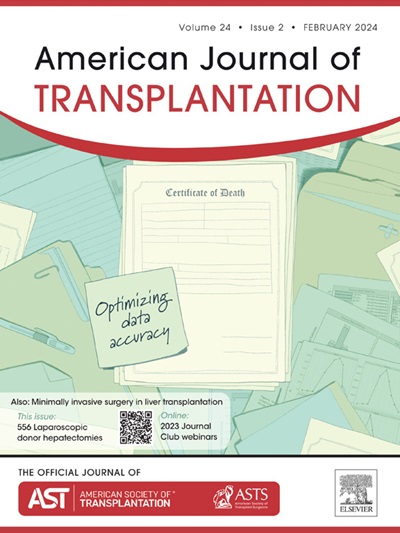通过供体源性细胞游离 DNA 检测供体源性移植后淋巴组织增生性疾病。
IF 8.9
2区 医学
Q1 SURGERY
引用次数: 0
摘要
移植后淋巴组织增生性疾病(PTLD)是器官移植后一种危及生命的并发症,通常在患者出现非特异性体征和/或移植器官功能障碍后被诊断出来。我们在此报告了一例肾移植受者的病例,该受者在常规血清监测中发现循环供体衍生细胞游离 DNA(dd-cfDNA)水平高度升高,最初没有器官功能障碍,活检也没有发现同种异体排斥反应的证据。后来因病因成像检查发现腹膜后淋巴结病变和异体肝脏肿块,活检显示为移植后淋巴组织增生性疾病/弥漫性大B细胞淋巴瘤(DLBCL)。该患者循环中 dd-cfDNA 水平升高,促使对用于检测 DLBCL 上 dd-cfDNA 的 266 个单核苷酸多态性进行了有针对性的下一代测序,从而确定其为供体来源。患者在减少免疫抑制和接受了 6 个周期的免疫化疗后,病情完全缓解,异体肾功能得以保留。该病例表明,dd-cfDNA 可作为一种早期检测工具,用于罕见但可能危及生命的供体源性恶性肿瘤病例,如供体源性 PTLD。本文章由计算机程序翻译,如有差异,请以英文原文为准。
Donor-derived posttransplant lymphoproliferative disease detection by donor-derived cell-free DNA
Posttransplant lymphoproliferative disorder (PTLD) is a life-threatening complication of organ transplantation, commonly diagnosed after patients present with nonspecific constitutional symptoms and/or transplant organ dysfunction. In this article, we report a case of a kidney transplant recipient who was found to have highly elevated circulating donor-derived cell-free DNA (dd-cfDNA) levels on routine serum surveillance for allograft rejection, initially without organ dysfunction or evidence of allograft rejection on biopsy. Later, for cause imaging revealed retroperitoneal lymphadenopathy and an allograft hilar mass, which was biopsied to show PTLD/diffuse large B cell lymphoma. The elevated circulating dd-cfDNA levels in this patient prompted targeted next-generation sequencing of the same 266 single-nucleotide polymorphisms used to detect dd-cfDNA on the diffuse large B cell lymphoma, which identified it as derived from the donor. The patient achieved complete remission with retained allograft kidney function after reduced immunosuppression and 6 cycles of immunochemotherapy. This case suggests that dd-cfDNA may be an early detection tool in rare but potentially life-threatening cases of donor-derived malignancy, such as donor-derived PTLD.
求助全文
通过发布文献求助,成功后即可免费获取论文全文。
去求助
来源期刊
CiteScore
18.70
自引率
4.50%
发文量
346
审稿时长
26 days
期刊介绍:
The American Journal of Transplantation is a leading journal in the field of transplantation. It serves as a forum for debate and reassessment, an agent of change, and a major platform for promoting understanding, improving results, and advancing science. Published monthly, it provides an essential resource for researchers and clinicians worldwide.
The journal publishes original articles, case reports, invited reviews, letters to the editor, critical reviews, news features, consensus documents, and guidelines over 12 issues a year. It covers all major subject areas in transplantation, including thoracic (heart, lung), abdominal (kidney, liver, pancreas, islets), tissue and stem cell transplantation, organ and tissue donation and preservation, tissue injury, repair, inflammation, and aging, histocompatibility, drugs and pharmacology, graft survival, and prevention of graft dysfunction and failure. It also explores ethical and social issues in the field.

 求助内容:
求助内容: 应助结果提醒方式:
应助结果提醒方式:


